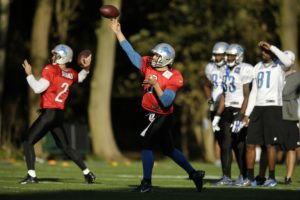KANSAS CITY, Mo. – Excitement of the unknown filled the Chiefs training facility as the team prepared to fly overseas Thursday night in advance of Sunday’s game against the Detroit Lions in London.

(AP Photo/Alastair Grant)
The weekend marks the first time the Chiefs will participate in the NFL’s International Series at Wembley Stadium and for many players the trip represents a maiden voyage to Europe.
The nine-hour flight across the Atlantic Ocean, however, offers something else for the uninitiated traveler, although it won’t be pleasant as players adjust to the five-hour time zone difference from central time.
Sluggishness, difficultly concentrating during daylight hours and excessive sleepiness are all symptoms of a condition commonly referred to as jet lag, which a lot of Chiefs personnel who haven’t been overseas will soon experience.
The syndrome falls in a medical category with the American Academy of Sleep Medicine, according to Redo Purnell, who serves as a sleep coordinator at Geary Community Hospital in Junction City, Kan.
“It’s called circadian rhythm disorder,” said Redo Purnell, a certified registered respiratory therapist and polysomnographic technologist. “What happens with jet lag, as you cross so many time zones, your body changes because the circadian rhythm is our internal biological clock. When you kind of disrupt that, you have to get it back synchronized.”
Experienced overseas travelers know the challenges of dealing with jet lag, but NFL teams traveling across the ocean have a large obstacle to overcome in a short span.
“They’re going from the U.S. to London,” Purnell said. “The West to the East is probably the worst way to travel because you go past so many time zones. Your body can’t adjust and you have to have so many ways to adjust it.”
Chiefs right guard Laurent Duvernay-Tardif, who is four month shy of finishing requirements to become a medical doctor, agreed.
“It’s not everybody has a chance to travel overseas and not everybody has experienced jet lag,” Duvernay-Tardif said. “A two-hour, three-hour jet lag when you travel inside the country is really not the same thing as a six-hour.”
If not prepared, travelers will experience insomnia and side effects, which could include constipation and diarrhea, Purnell said.
“Your whole body chemistry is off because the melatonin is the hormone in your body that helps tell us when to sleep, when to wake up,” he said. “And with the melatonin not being active as it should, once it gets disrupted, the whole body is off.”
*****
There are various strategies to help the adjustment period to overcome circadian rhythm disorder and a lot surrounds changing routine before boarding a flight, according to Purnell.
The Chiefs did not consult with a sleep specialist; instead the team relied on head athletic trainer Rick Burkholder to advise players on how to deal with the trans-Atlantic flight.

(AP Photo/LM Otero)
But Purnell drew on his area of expertise to offer advice.
“What they need to do to prepare themselves with a non-24-hour program where the night before they go is to take themselves off rhythm,” Purnell said. “So when they fly over they put themselves back on rhythm.
“If they can stay up before they fly, then when they get on the plane, they can sleep. If they keep their normal rhythm, that’s what’s going to take them off. If you offset your rhythm before you go, you can put it back on time.”
Duvernay-Tardif once again agreed with Purnell, and the offensive lineman said he changed his sleeping time earlier in the week by going to bed early, and then waking up early to adjust to European time.
“I think that’s the best way to deal with jet lag,” Duvernay-Tardif said. “I think it’s very important to put emphasis on that. I told the guys that was my little doctor tip for them because I think it can make a serious difference.”
But as with any advice – even if it comes from someone with medical expertise as Duvernay-Tardif – it is up to the individual to take heed.
The Chiefs didn’t have the luxury of adjusting sleeping habits since the team stayed in the U.S. and the practice routine wasn’t altered before flying.
The game week schedule also depends on the players to get as much sleep as possible on the plane.
“We’re leaving around 7 (p.m.), get some sleep on the plane,” Reid said. “I’ve had a chance to go to Japan and play over there and you get off that plane with a few hours difference going there too and you want to just get out and get moving. You want to get your body back the way you want it. Nine hours you have to rest on that plane, and then we’ll get things going for Friday once we get there.”
That could prove easier said than done because each individual has sleeping habits or utilizes methods to help them rest.
Personal preferences are typically disrupted on a plane when factoring in turbulence, passengers moving around other passengers, listening to music or watching movies.
And there is also the weight of NFL players to consider.
“Somebody with 300-plus pounds needs all the rest they can get,” Purnell said. “They watch movies on a flight, they feed you, some even offer alcohol. It’s recommended not to have caffeine or alcohol or listen to anything that stimulates you to keep you from going to sleep.”
Chiefs kicker Cairo Santos, who visited London as an NFL ambassador in July, agreed on the sleeping arrangements.
“That’s one advantage of me being a smaller guy because I can sleep anywhere,” the 5-8, 160-pound Santos said. “I can’t imagine (6-3, 346-pound defensive tackle) Dontari Poe fitting in those chairs, but from what I hear we’re going to have a lot of space on the plane.”
*****
Chiefs defensive tackle Hebron Fangupo is very familiar with jet lag as a frequent traveler to Fiji during the offseason.
He was also a member of the Pittsburgh Steelers in 2013 when the Steelers played the Minnesota Vikings in London.
The 6-0, 324 Fangupo said as best as he could recall the Steelers arrived on a Wednesday and practiced Thursday, but he felt lethargic from the flight after having difficulty falling asleep given the close accommodations.
“It wasn’t cool, man,” Fangupo said. “Your feet swell up, you can’t stretch out your legs, your neck hurts and it’s nine hours.”
While the team allowed the players opportunities to sleep, Fangupo said it took him two days before he felt good on Friday and a lot of his teammates wanted to take in the historical sites.
“Of course, it was a business trip, but then again it’s not every day you can go to London,” Fangupo said. “I guess there’s a fine line between enjoying yourself and getting some rest. You have to get some rest, but jet lag is real.”
The Chiefs implemented a system so players won’t have much time to take in the surroundings given their Friday arrival.
Coach Andy Reid had his team go through a normal Wednesday and Thursday before leaving Thursday night with a Friday arrival at 9:30 a.m. local time. The Chiefs will then practice Friday at 3:45 p.m. to coincide with a normal week of game preparation.
The approach was designed to ensure the Chiefs understood the purpose of the trip.
“It’s not a vacation, that’s not what this is,” Reid said. “They can go do that another time. We’re going over to play a good Lions football team. I want to make sure we have maximum preparation right here, and understand why we’re going there.”

Oct. 28, 2015; Chandler’s Cross, England; Detroit Lions quarterback Matthew Stafford (9) and quarterback Ricky Stanzi (2) during practice. (AP Photo/Matt Dunham)
Each team that has participated in the International Series had a different approach to playing in London, including the Chiefs’ opponent.
Detroit stayed the course from what it did in 2014, which marked the Lions’ first appearance in the International Series.
The Lions flew out of Detroit Monday night and arrived Tuesday, allowing four days to acclimate to the time zone change before the Chiefs arrive.
Purnell believed the Lions used a viable tactic given the recovery time from jet lag.
“Average days run anywhere from three to five days to get yourself back on track,” Purnell said. “The Detroit Lions are being smart. They’re trying to get all their players back on track from this time zone change. They’re trying to get a jump on the Chiefs by bringing their team over there early enough.”
An NFL spokeswoman said in an email the league didn’t maintain a list of which teams arrived early or late going back to when the International Series began in 2007.
But a league spokesman said in a separate email the previous two teams to play in London this season reflected different patterns.
The New York Jets and Miami Dolphins arrived the Friday before Sunday’s game in Week 4, while the Buffalo Bills arrived on a Monday and the Jacksonville Jaguars showed up Friday for the Week 7 game.
Results on showing up early or later in the week are mixed.
“I looked at the win-loss,” Reid said. “It’s about 50-50 on who goes Thursday, who goes Sunday. I mean, it’s pretty even, or at least it was when I checked it. I don’t know about this year, but that’s the way it was when I set this up.”
The Chiefs head coach has a point, of course.
The early arriving Lions defeated the Atlanta Falcons 22-21 in 2014, but the Jaguars defeated a well-rested Buffalo team, and even Fangupo’s Steelers lost to the Vikings.
Detroit has an advantage of adjusting to the time zone, but the NFL is a performance-based league and teams still have to settle things on the field.
“One of the things that you learn very quickly in this league is that there’s not a whole lot of edges to be gained other than fine play,” Lions coach Jim Caldwell told the media Thursday in London. “And that’s what makes the difference.”
———-
Herbie Teope is the lead Chiefs beat writer for ChiefsDigest.com and The Topeka Capital-Journal. Use the contact page to reach him or find him on Twitter: @HerbieTeope.
———-

